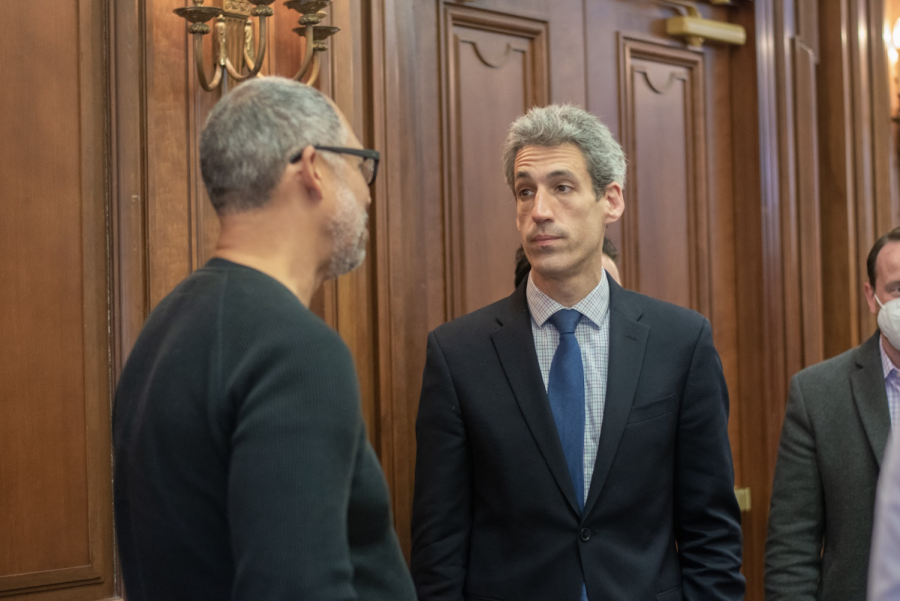Mayor Daniel Biss talks town-gown relations at Northwestern, UChicago event
Jacob Wendler/Daily Senior Staffer
Mayor Daniel Biss (right) speaks with University of Chicago Prof. Adam Green.
November 15, 2022
Mayor Daniel Biss spoke about the complexities of Northwestern’s economic, cultural and political relationship with the Evanston community Monday afternoon.
About 15 students, faculty, staff and community members attended “The View from Two Sides of Chicago,” an event aimed at facilitating conversations between students and university representatives from NU and the University of Chicago and community leaders from their home cities.
The event was hosted by Public Books, a digital magazine that aims to engage academics with a broader audience. It featured a student roundtable and panels with leadership, in addition to Biss’ segment.
The conversation with Biss was moderated by NU history Prof. Geraldo Cadava, a co-editor in chief at Public Books.
“(Public Books is) very much about the interface between a broader audience of readers and the academy,” Cadava said. “And so I think town and gown relationships is certainly part of that conversation.”
Biss confidently said he spends 12% of his time and energy dealing with issues directly related to NU.
The University’s status in the city as a large employer, a landmark and a point of tension distinguishes Evanston from other similar-sized Chicago suburbs such as Schaumburg or Arlington Heights, Biss said. Biss cited the University’s tax exemption as one place where tension arises between the two institutions.
“The best of the relationship occurs when there is not a clean separation,” Biss said.
He added that NU plays a role in most of his mayoral duties, even when it’s not the primary actor.
Interactions between the University and the city are often positive, Biss said. He said the primary goal of town-gown relations should be to find as many opportunities for beneficial collaboration as possible.
“The more we develop all that positive-sum work, the more healthy and vibrant the foundation of the relationship upon which we can have the more difficult zero-sum conversations,” Biss said. “And as a postscript, maybe the more of that stuff that is occurring, the more ideas we’ll have to pull off the zero-sum list.”
Biss cited reparations, climate action and affordable housing as opportunities for collaboration between NU and Evanston.
He also pointed to political science Prof. Alvin B. Tillery, Jr.’s research on the impact of Evanston’s reparations program as work that benefits both the University and the city.
“There’s a lot of activity going on at this institution that I think could lead to potential partnerships around achievement of our climate goals, where again it’s just purely positive-sum,” Biss said.
Biss also discussed the economic relationship between NU and Evanston.
NU’s primary economic contribution comes from PILOTs, or payments in lieu of taxes, which amount to about $1 million per year, Biss said. He said private universities of similar size and stature often pay more in PILOTs to the cities in which they are located.
Biss explained that the University’s tax exemption comes from a “super special protection” under Evanston’s City Charter, the Illinois state constitution and other state laws. NU and Evanston were created around the same time; Biss said Evanston doesn’t have much leverage over the university because the relationship goes back to the founding of both institutions.
While NU students have been in Evanston for most of the city’s existence, Biss said students’ relationship to the city is distinct from that of long-time Evanston residents. Still, he said he sees himself as the students’ mayor.
“If we’re going to be really, really ruthlessly honest here, the incentives of democracy weigh the voice of a relatively transient person who probably votes somewhere else differently than the voice of someone who’s lived here a decade and is likely to live here another decade,” Biss said.
Adam Green, a professor of history and the college at the University of Chicago, asked Biss about how Black residents in Evanston view NU.
In response, Biss said NU rarely comes up in his conversations with Black residents, and noted that he does not presume to have a definitive answer to the question. He added that, in his experience, Black residents do not frequently cite their children attending NU as an aspiration.
“This is an issue with higher education institutions everywhere,” Green said. “(Universities) present themselves as resources, and yet in some ways, who those resources are available for is a very narrow band.”
Email: jacobwendler2025@u.northwestern.edu
Twitter: @jacob_wendler
Related Stories:
— Schill intends to continue Good Neighbor Fund, make Ryan Field a ‘win-win’ for Evanston and NU
— Mayor Daniel Biss discusses turbulent city manager search during town hall forum
— Daniel Biss discusses policing, racial equity and town-gown relations in Northwestern forum



